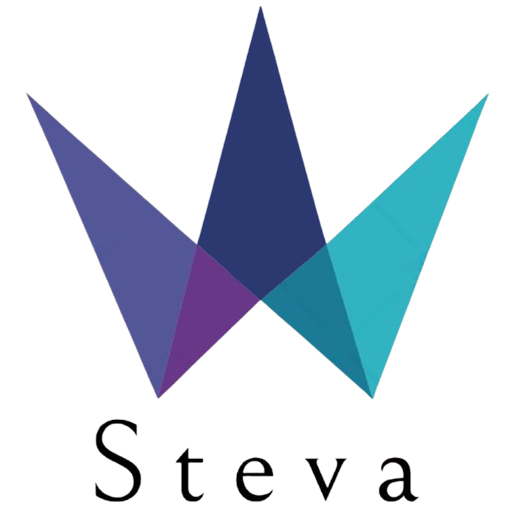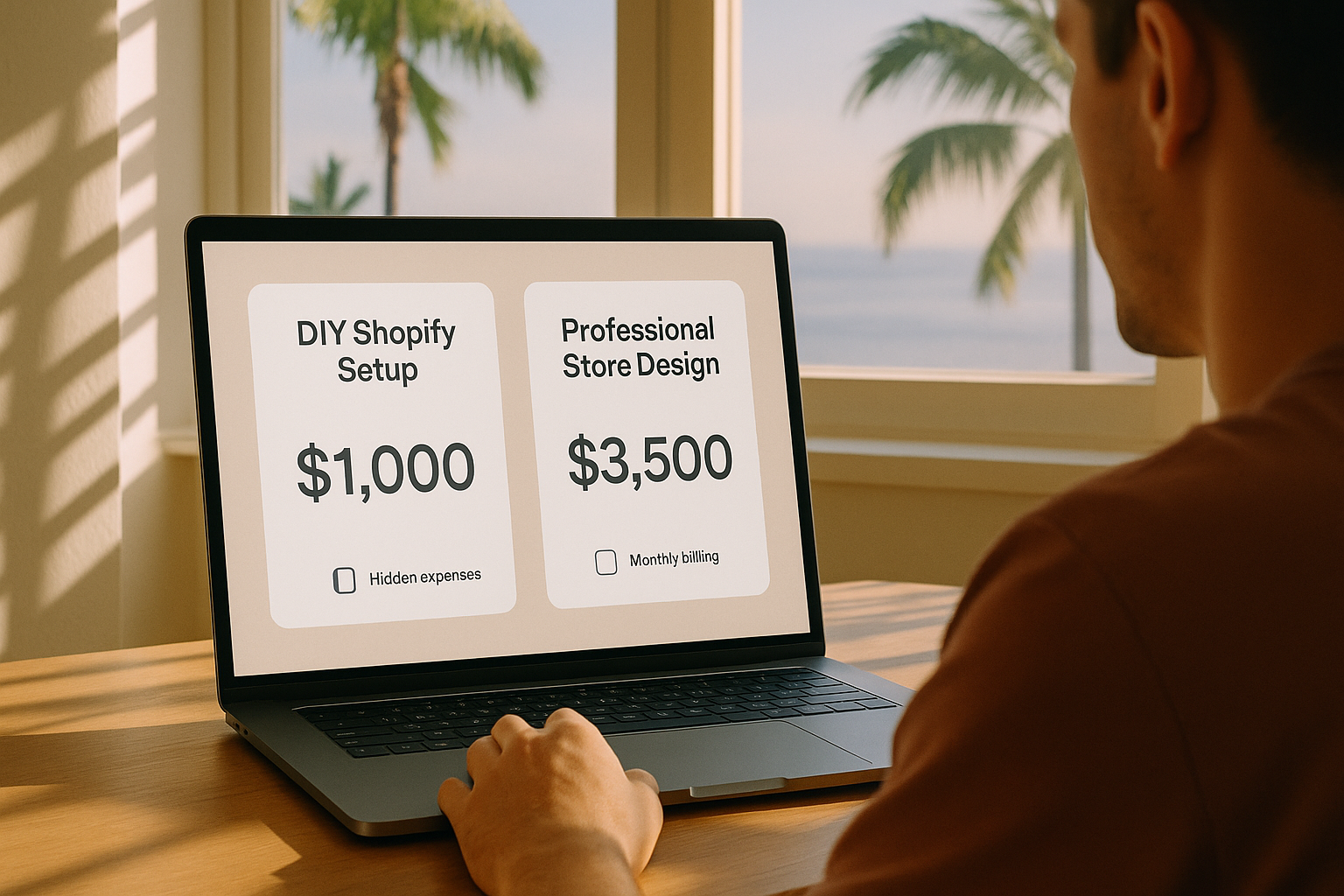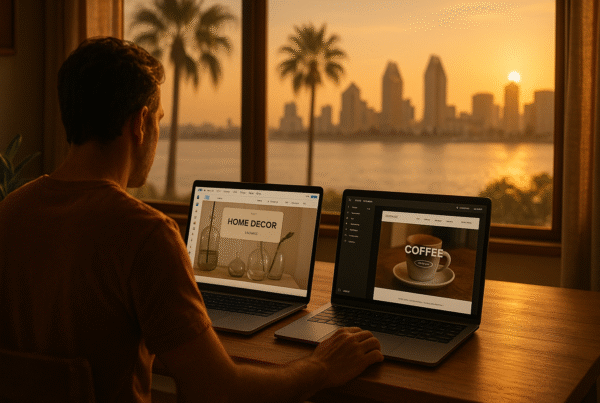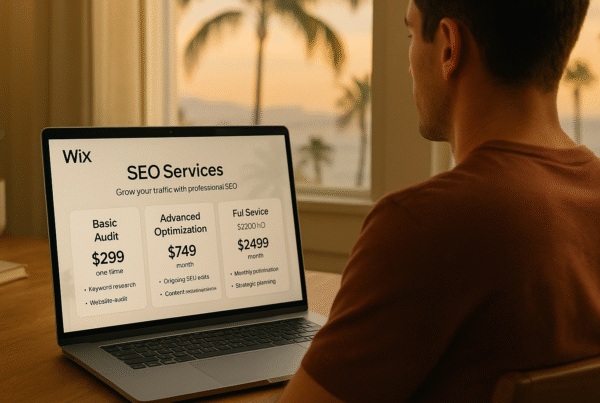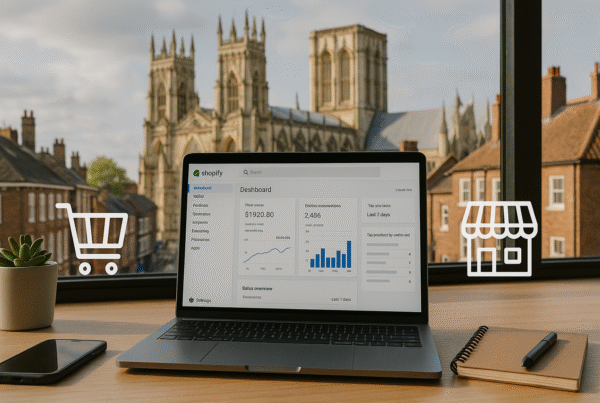What about the Shopify website development cost San Diego businesses need to budget for? You’re likely to encounter prices ranging from $100 to over $40,000, depending on your specific needs. This significant variation often leaves business owners confused about what they should expect to pay.
The truth is that the cost of a Shopify website depends on several factors. Basic services with template customization cost between $500 and $1,000, while custom-designed Shopify stores typically range from $5,000 to $20,000. Additionally, you’ll need to consider the Shopify website cost San Diego subscription plans, which start at just $5 per month for the Starter plan and go up to $399 per month for the Advanced plan.
Whether you’re planning a DIY approach or hiring professional Shopify website designers in San Diego, understanding these costs upfront will help you make the right decision for your business. This guide breaks down every expense you might encounter when developing your Shopify store in 2025.
Understanding Shopify Store Development in 2025
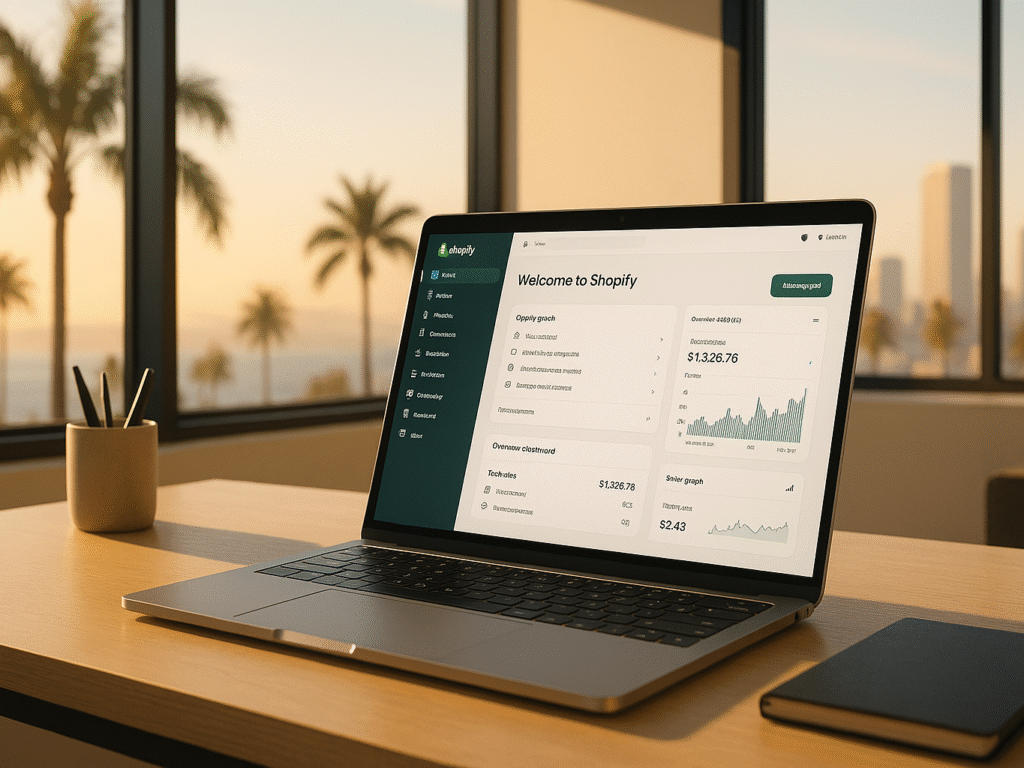
Shopify has established itself as the leading e-commerce platform in 2025, powering over 4.79 million live stores globally as of January. San Diego businesses are rapidly adopting this versatile platform, with the local Shopify landscape undergoing significant evolution this year.
1. Why Shopify is popular in San Diego
The San Diego market has enthusiastically embraced Shopify, with over 4,117 active Shopify stores currently operating in the city. This popularity stems from several factors that make Shopify particularly appealing to local businesses.
Firstly, San Diego’s e-commerce sector has experienced significant expansion in recent years. According to local commerce reports, online retail sales increased by more than 20% year-over-year between 2021 and 2023. This growth has created fertile ground for the adoption of Shopify.
Small to medium-sized businesses and startups in San Diego find Shopify especially attractive due to its versatility and affordable pricing structure. Furthermore, the platform’s scalability allows companies to grow without limitations, accommodating everything from small shops to larger enterprises.
The city’s diverse economy, encompassing tourism, healthcare, and lifestyle sectors, presents unique opportunities for niche online stores. Local Shopify developers understand these dynamics, crafting solutions that integrate e-commerce best practices with the specific market trends of San Diego.
2. What’s new in Shopify development this year
The Shopify Summer ’25 Edition brings over 150 new features, reshaping how San Diego businesses approach e-commerce. Key updates include Horizon, a flexible new theme foundation with drag-and-drop blocks, and SideKick, an AI assistant that analyzes store data, supports 20 languages, and now offers voice chat for faster business insights.
Retailers benefit from a redesigned POS app with faster checkout, advanced search, and hybrid “ship and carry out” features. Shopify Payments now supports 16 more countries, helping San Diego stores cut foreign exchange costs. Additionally, the new Knowledge Base app enhances how AI assistants highlight the unique value of your products.
For developers and agencies offering Shopify services in San Diego, the platform now provides improved tools, including Shopify Functions support, which enables AI-driven code generation and JavaScript-to-Rust code conversion. These advancements help reduce development time and costs, potentially lowering the overall Shopify website development cost San Diego businesses encounter. Additionally, companies can further optimize their investment by implementing effective Shopify SEO strategies that maximize organic visibility and drive long-term growth.
Planning Your Shopify Store: Key Questions to Ask

Planning your Shopify store requires careful consideration of multiple factors that directly impact development costs. Understanding your business requirements upfront helps avoid costly redesigns and ensures your chosen approach aligns with long-term goals and available resources.
1. What’s your business size and budget?
The size of your business fundamentally determines the complexity and features required for your Shopify store. Small startups with limited inventory typically require basic functionality, while established businesses need advanced features such as multi-channel selling, inventory management, and complex product variations.
Shopify website cost: San Diego budget allocation has a direct impact on your development path. San Diego businesses with budgets under $3,000 often benefit from DIY approaches or affordable Shopify designers for basic professional customization. In contrast, those with budgets of $10,000 or more can access comprehensive, custom development with advanced integrations and unique design elements.
2. How many products will you sell?
Product quantity significantly impacts your store’s architecture, navigation structure, and required functionality. Stores with fewer than 50 products can utilize simple layouts and basic categorization, while larger catalogs demand sophisticated filtering systems and search capabilities.
Consider these product-based requirements:
- Small catalog (1-50 products): Simple navigation, basic product pages, minimal filtering needs
- Medium catalog (51-500 products): Advanced search functionality, multiple category levels, product comparison features
- Extensive catalog (500+ products): Complex filtering systems, bulk management tools, automated product recommendations
Your product count also affects ongoing management time and potential app requirements. Stores with extensive inventories often require specialized apps for bulk editing, inventory tracking, and automated product updates, which can add $50-$200 per month to operational costs.
3. Do you need custom features?
Custom features significantly increase development costs but provide competitive advantages. Standard Shopify functionality covers basic e-commerce needs; however, unique business models often require specialized solutions, such as subscription management, custom calculators, or industry-specific integrations.
Evaluate whether your business processes require modifications beyond Shopify’s standard capabilities. Custom features typically add 30-60% to development costs, with complex functionality potentially doubling project expenses depending on technical requirements and integration complexity.
Essential custom feature considerations:
- Payment processing: Specialized payment gateways, installment plans, or industry-specific payment methods
- Product customization: Size calculators, color selectors, or personalization tools requiring custom development
- Third-party integrations: ERP systems, inventory management, or specialized shipping solutions
DIY Shopify Store Setup: What You Can Expect

Building your own Shopify store has become remarkably accessible in 2025, requiring minimal technical skills and offering significant cost savings. If you’re considering the DIY route for your San Diego business, here’s what to expect across key areas.
1. Using free themes and templates
Shopify currently offers 13+ free themes that undergo rigorous testing to ensure reliability and stability. These professionally designed templates provide a solid foundation without requiring any coding knowledge.
Free themes come with customization options for styles, colors, fonts, and layouts, though they offer basic to moderate features compared to premium alternatives. You can enhance your store’s appearance by:
- Changing logos, colors, and fonts (30-60 minutes)
- Adjusting layouts and content sections
- Adding your product content and images
Although free, these themes are carefully crafted by Shopify experts and feature responsive designs that look great on both desktop and mobile devices. Consequently, they’re ideal for new businesses with limited budgets, those testing concepts before making a significant investment, or stores with simple product catalogs of under 100 items.
2. Basic Shopify plan costs
The Basic Shopify plan costs $19 per month when billed annually (a 25% savings) or $39 per month when paid monthly. This entry-level plan provides essential features for solo entrepreneurs, including:
One digital branded eCommerce storefront with unlimited product listings, staff accounts, and 24/7 customer support. Competitive transaction fees of 2.9% + $0.30 for domestic credit cards. Online store with built-in blogging engine. SSL certificate for secure shopping
The Basic plan supports international sales tools for cross-border management; nonetheless, it lacks certain advanced features, such as staff accounts for more than two people and third-party carrier-calculated shipping. For most beginners, however, this plan provides sufficient functionality to launch a professional store.
3. Essential apps and integrations
Although Shopify covers fundamental business needs out of the box, apps extend your store’s capabilities. The Shopify App Store features over 8,000 applications that undergo a 100-point review process before publication.
Essential free apps to consider include:
- Email marketing tools like Shopify Email
- Chat functionality through Shopify Inbox
- Translation services via Shopify Translate & Adapt
- Automation through Shopify Flow
- Customer information capture with Shopify Forms
While many apps offer free plans, paid options range from $9 to $299 per month. Thus, a strategic approach is recommended, start with free versions and upgrade only when your business requires advanced features. This approach helps control the initial Shopify website development cost that aSanDiego entrepreneurs face.
4. Time and learning curve involved
Setting up a basic DIY Shopify store typically takes 1-5 days, with specific tasks requiring varying time investments:
Basic store with a single product: A few hours. Theme selection and customization: Hours to several days. Adding products and content: The most time-consuming phase, especially with numerous products
The learning curve varies based on your technical background. For beginners with no e-commerce experience, expect to spend most of your free time initially figuring out various aspects of e-commerce. The platform is designed for users at all technical levels, with basic functionality that can be learned in a few days; however, mastering advanced features may take several weeks.
First-time store owners often feel overwhelmed by the simultaneous learning of site design, SEO, marketing, legal policies, taxes, and analytics. Therefore, focusing on one aspect at a time and utilizing Shopify’s extensive free educational resources can make the learning process more manageable.
Professional Shopify Design: What It Costs
Professional Shopify design services provide a stark contrast to DIY solutions, with pricing structures that reflect the expertise and customization levels required. For San Diego businesses seeking experienced Shopify website designers, understanding these costs upfront helps you make informed decisions for your e-commerce venture.
1. Shopify website designer cost in San Diego
In San Diego, Professional Shopify website development costs typically range from $500 to $25,000, depending on customization requirements. For small businesses seeking basic modifications to existing themes, costs start around $500 to $2,000. In contrast, established Shopify design agencies charge between $5,000 and $20,000 for custom-designed Shopify websites.
Local San Diego designers’ rates generally reflect national averages, with the median hourly rate for Shopify professionals ranging from $30 (for junior developers) to $200 (for senior developers). The costs vary based on several factors, including project complexity, designer experience, and specific requirements.
(i) Affordable Marketing: Your local San Diego Shopify & digital marketing partner
Affordable Marketing, based in downtown San Diego, has crafted custom Shopify stores since 2003. With over two decades of experience in ecommerce and digital strategy, they empower San Diego businesses, from startups to retailers, to scale online with conversion-driven design, SEO, and reliable post-launch support
a) Who They’re Best For
Ideal for San Diego-based small to mid-sized businesses seeking a balance of quality and value with strong local support and full-service ecommerce development.
- Startups launching first stores
- Boutique retailers needing brand‑focused designs
- Businesses wanting long-term local support
b) What They Offer
They provide end-to-end Shopify solutions combining design, SEO, app integration, and maintenance, designed for long-term growth and customer success.
- Custom theme design & setup
- Shopify SEO optimization
- App integration & migration
- Ongoing support & content services
c) Estimated Pricing & Project Timelines
Although exact figures aren’t public, Shopify website development cost in San Diego projects typically falls in the $2,500–$7,000 range, depending on complexity. Delivery is generally within 3–6 weeks, aligning with the completion of full development and marketing implementation.
d) Why Choose This Agency?
Affordable Marketing stands out for its deep roots in San Diego, blending conversion-focused Shopify expertise with dedicated local service. Their 20+ years of experience mean fewer surprises and faster results, plus personalized training and ongoing marketing support, to help local businesses succeed well into the future.
e) For more information
Visit their website or drop by Affordable Marketing, located at 422 Market St, San Diego, CA 92101. Call (949) 247‑2117 or schedule a free Zoom consultation.
(ii) MageCloud: Full‑stack Shopify & ecommerce agency, built for growth
MageCloud is a San Diego-based, full-service e-commerce agency founded in 2014. Their 50+ expert team offers Shopify design, development, SEO, migrations, and integrations, focused on conversion-driven growth globally and locally
a) Who They’re Best For
Ideal for San Diego businesses needing scalable, technical e-commerce solutions, including migrations, platform integrations, or fine-tuned performance improvements.
- Brands scaling from basic to Shopify Plus
- Businesses migrating from Magento/WooCommerce
- Companies needing SEO, speed, or multi-store architecture
b) What They Offer
MageCloud delivers end-to-end Shopify solutions with a month-by-month growth mindset, covering design, technical migration, performance optimization, SEO, and ongoing support.
- Shopify site audit, design & development
- Speed & security optimization
- Platform integrations & plugin build
- SEO/SEM and monthly support
c) Estimated Pricing & Project Timelines
Official Shopify website development cost in San Diego figures aren’t public. GoodFirms shows typical engagements at $50–$99/hr, and project scales often reach $10,000+ depending on complexity. Smaller projects (branding/migration) likely deliver in 4–8 weeks, larger custom builds may take 3+ months.
d) Why Choose This Agency?
MageCloud stands out for its technical depth and transparent process, charging only for measurable output and offering Trello tracking. Their validated results, like doubling conversion rates post-migration, make them ideal for San Diego businesses seeking ROI, not just websites.
e) For more information:
Schedule a free Shopify audit at their San Diego office through the website or visit MageCloud, located at 4001 Inglewood Ave, Building 101, Suite 664, Redondo Beach, CA 90278. Call +14159927667 or schedule a free Zoom consultation or email info@magecloud.agency
(iii) Storm Brain: Smarter Digital Marketing & Shopify Development
Storm Brain is a San Diego-based digital marketing agency specializing in Shopify development, branding, and content strategy. A Clutch award-winner with 100+ verified reviews, they combine creative design with data-driven performance to build online stores that convert and scale.
a) Who They’re Best For
Perfect for San Diego businesses seeking a comprehensive approach, combining branding, SEO, UX/UI, and conversion-focused Shopify development.
- Retailers need both design and digital marketing
- Boutique brands building a strong identity
- E-commerce businesses seeking ongoing support
b) What They Offer
They provide end-to-end services, from strategy and branding to Shopify build, content creation, SEO, and marketing, all in one cohesive package supported by expert design and measurable performance.
- Brand strategy & identity design
- Shopify UI/UX & development
- SEO & CRO optimization
- Content, PPC, and paid media
c) Estimated Pricing & Project Timelines
- Basic Shopify stores: $2,000–$5,000 (2–4 weeks)
- Custom builds: $10,000–$30,000+ (8–12 weeks)
- App integrations and maintenance services are billed hourly ($50–$150/hr) or via fixed-price packages ($3,000–$15,000)
d) Why Choose This Agency?
Storm Brain’s deep local roots ensure clear, responsive communication and tailored insights into San Diego’s market. They’ve earned a 4.9★ rating from over 100 reviews, praised for their transparent processes, “no question too small” approach, and measurable performance gains across SEO, conversion, and marketing campaigns, making them ideal for growth-focused SMBs.
e) For more information
Visit stormbrain.com, call 619‑618‑0344, or stop by 2150 W Washington St, Suite 104, San Diego, CA 92110 for a free consultation.
2. Freelancer vs agency pricing
Affordable Shopify designers in San Diego generally charge lower rates than agencies, making them a budget-friendly option for small projects. Beginners: $15/hour
- Intermediate: $30/project
- Expert: $100/project
Agencies typically command higher fees but offer comprehensive services. They employ dedicated teams for development, design, SEO, and marketing. While freelancers generally charge between $15- $150 per hour, agency rates typically range from $33 to $250 per hour. This price difference reflects the broader expertise and structured project management that agencies provide.
| Name | Price | Rating | Service Type | Time | Key Features Included | Profile Link |
| Coco A | $30 | 4.9⭐(41) | Shopify redesign/design | 10 days | Store design/redesign, mobile responsive, branding | View on Fiverr |
| Waleed M | $70 | 4.8⭐(115) | Shopify store design | 13 days | Dropshipping support, responsive layout, SEO-optimized | View on Fiverr |
| Amelia D | $100 | 5.0(19) | Shopify store + SEO | 13 days | SEO-ready, POD support, full ecommerce optimization | View on Fiverr |
| M. Wakeel | $50 | 5.0(51) | Clone/redesign services | 10 days | Homepage mockup, existing-store cloning, fast edits | View on Fiverr |
| Nasar Iqbal | $50 | 5.0(30) | Homepage & mockup design | 10 days | Homepage layout, UX/UI-focused mockups | View on Fiverr |
3. Custom theme development costs
Custom Shopify website development cost, San Diego theme development varies significantly in price based on project scope. Basic customization of pre-purchased templates costs between $300 and $600. For medium-scale stores that require more extensive customization, expect to pay between $600 and $1,000.
Full custom theme development generally ranges from $2,000 to $15,000. For enterprise-level projects with advanced functionality, costs can exceed $20,000. US-based developers typically charge between $500 and $15,000, whereas international developers may offer services for as little as $300 to as much as $5,000.
4. Hourly vs project-based pricing models
Most Shopify experts offer both hourly and project-based pricing structures. Hourly pricing provides flexibility for projects with uncertain scope, but it also makes final costs unpredictable. Rates for North American developers range from $75 to $150 per hour, while developers from South America and Asia might charge between $25 and $75 per hour.
Project-based pricing offers budget predictability, making it ideal for well-defined projects. Fixed-rate pricing examples include:
- Minor changes: $200 to $800
- Theme customization: $1,000 to $3,500
- Custom theme development: $3,000 to $10,000
- Complete Shopify store: $10,000 to $50,000
Many San Diego businesses ultimately find that investing in professional design services offers better long-term value despite higher upfront costs.
| Name | Hourly Rate | Rating | Success Rate | Specialization | Experience & Skills | Profile Link |
| Maria | $100/hr | 5.0⭐ | 100% | Custom themes, apps, API integration | Expert in Liquid, PHP, JS, jQuery | Shopify Expert on Upwork |
| Ejaz R | $60/hr | 4.9⭐ | 100% | Full Shopify store setup, template/custom | 100+ Shopify stores, 5+ years | Shopify Setup on Upwork |
| Humair Ali K | $80/hr | 4.9⭐ | 100% | Store design, theme customization | Builds fast, SEO-friendly stores | Shopify Store Dev |
| Hannah L | $75/hr | 5.0⭐ | 100% | UX/UI & high-conversion store design | 24+ yrs in UX/UI, 4,000+ projects | Shopify UX/UI Expert |
| Waqar Ahmad | $60/hr | 5.0⭐ | 98% | Custom-coded sections & templates | Dropshipping, conversion-focused | Shopify Custom Dev |
San Diego Shopify SEO: 2025 Local Ranking Tactics for E-Commerce Stores: Building your Shopify store is just the beginning. Discover proven local SEO strategies that help San Diego businesses dominate search results and attract more customers. Learn advanced tactics that convert visitors into loyal customers.
Breaking Down the Total Shopify Website Cost
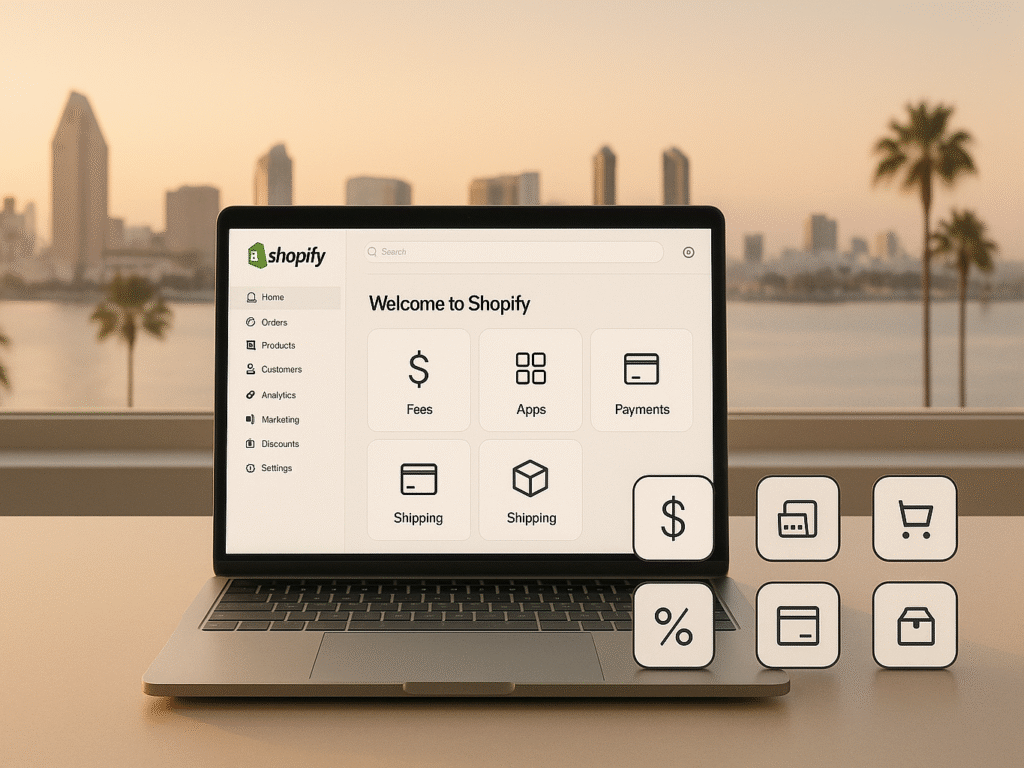
Beyond the basic setup and design, understanding the complete Shopify website development cost in San Diego requires examining several essential components. Let’s break down what your San Diego-based e-commerce venture will cost to operate in 2025.
1. Shopify subscription plans
Shopify offers tiered pricing that accommodates businesses of all sizes. The Basic plan starts at $19 per month when paid annually or $39 per month when paid monthly. The Grow plan (formerly known as the Shopify plan) costs $56 per month with annual billing or $79 per month every month. For larger operations, the Advanced plan costs $289 per month, annually.
Each tier offers progressively better transaction rates. Basic charges 1.9% + $0.25 for online transactions, Grow reduces this to 1.8% + $0.25, while Advanced offers 1.6% + $0.25. Moreover, third-party payment fees decrease as you upgrade: 2% for Basic, 1% for Grow, and 0.6% for Advanced.
2. Theme and template pricing
While Shopify provides free themes with basic customization options, premium themes typically cost between $150 and $350 as a one-time purchase. These paid options offer enhanced features, better mobile responsiveness, and more sophisticated layouts that can directly impact conversion rates.
3. App and plugin expenses
The average Shopify merchant spends approximately $58.49 monthly on apps. Essential apps range from $10 to $50 per month for SEO tools, $20 to $100 per month for inventory management, and are free to $30 per month for email marketing solutions. First, evaluate which functionalities your store truly needs before committing to paid options.
4. Ongoing maintenance and support
Monthly maintenance costs vary depending on the store’s complexity. Basic maintenance packages range from $50 to $200 per month, covering security monitoring and minor repairs. Standard maintenance ($200-$500 per month) includes regular backups and theme updates. Larger stores require advanced packages ($ 500-$1,000+/month) with custom development.
5. Hidden costs to watch for
Several unexpected Shopify website costs in San Diego expenses can impact your bottom line, including professional email accounts ($ 1-$5 per month per address) and shipping integration costs ($20-$50 per month). Payment processing fees also accumulate with volume, a consideration as your store grows. Subsequently, inventory holding costs and potential chargebacks should be factored into your total budget. For businesses with complex logistics needs, exploring contract warehousing solutions can help manage these expenses while improving operational efficiency.
Choosing the Right Path: DIY or Pro Design?
Deciding between DIY and professional Shopify development ultimately comes down to your specific business needs, budget constraints, and technical abilities. For some San Diego entrepreneurs, the DIY route offers valuable flexibility, yet others find professional assistance indispensable for long-term success.
1. When DIY makes sense
The DIY approach works best if you’re generally tech-savvy, comfortable learning new interfaces, or grew up with technology. This path is particularly suitable for businesses with tight budgets aiming to minimize upfront costs while leveraging Shopify’s affordable subscription plans. First, remember that DIY development creates a sense of accomplishment and control, allowing you to customize your store exactly as you envision.
Above all, consider DIY when:
- You’re testing a business concept before a significant investment
- Your business has a simple product catalog without complex customization needs
- You possess basic visual design skills or are willing to learn
2. When to hire a professional
Hiring a Shopify expert becomes necessary as your brand grows and website management diverts attention from core business activities. Similarly, professional help proves valuable when you’re rebranding and need a website refresh to match your new identity. Under those circumstances, the expertise offered by professionals often translates into significant long-term benefits.
Professional assistance is essential when:
- Your time is limited due to other business commitments
- You need custom features or unique product customization options
- Your store requires complex third-party integrations
- You’re operating under tight launch deadlines
3. Questions to ask before hiring
Before engaging a Shopify designer, clarify your project’s needs and budget. Essentially, ask potential designers about their project management processes and design timelines. Additionally, inquire about their experience with similar businesses in your industry and request client references.
Key questions should cover:
- What payment options and schedules do you offer?
- Will you handle both design and development, or outsource portions?
- What ongoing support do you provide after launch?
- How will you optimize my store for search engines?
San Diego Shopify SEO: 2025 Local Ranking Tactics for E-Commerce Stores: Ready to maximize your Shopify investment? Our comprehensive SEO guide reveals how San Diego businesses increase organic traffic by 300%. Get the insider strategies that turn your store into a local search powerhouse.
Budgeting Tips and Cost Reduction Strategies
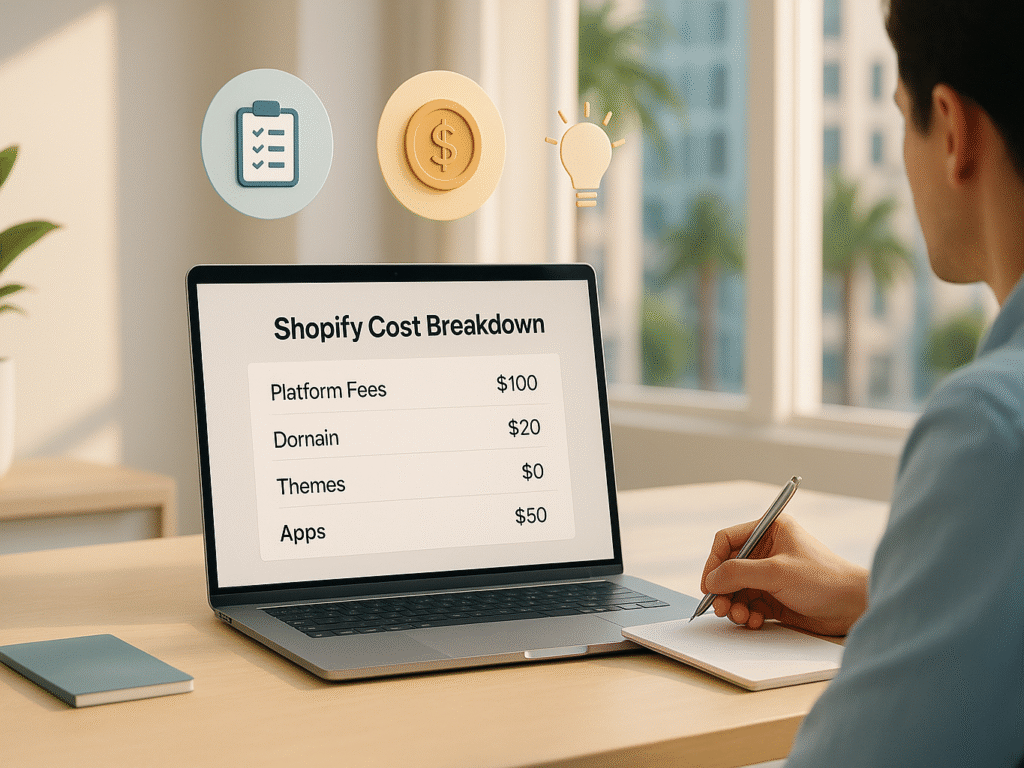
Effective budgeting strategies can significantly reduce Shopify website development costs in San Diego without compromising functionality. Thoughtful planning, phased development approaches, and strategic vendor selection enable San Diego businesses to maximize their e-commerce investment while maintaining high-quality standards.
1. Tips to reduce Shopify development cost
Start with essential features and gradually add advanced functionality as your business grows. This phased approach reduces initial investment while allowing you to test market response before committing to expensive customizations or premium applications.
Strategic cost reduction methods:
- Template customization: Modify existing themes instead of building from scratch, saving 40-60% on design costs
- Free app alternatives: Utilize Shopify’s native features and free apps before investing in premium solutions
- Bulk purchasing: Bundle multiple services with one provider for better rates and streamlined communication
Research multiple vendors and carefully compare their proposals to ensure the best selection. San Diego freelancers often offer competitive rates compared to agencies, although project management requirements may be more stringent. For businesses seeking to streamline operations, implementing the proper fulfillment apps can reduce ongoing operational costs while enhancing customer satisfaction. International developers offer significant savings, with rates 50-70% lower than those of US-based professionals.
Negotiate project scope and payment terms upfront. Fixed-price projects provide budget certainty, while hourly arrangements offer flexibility for undefined requirements. Many developers offer maintenance packages at reduced rates when bundled with initial development services.
Consider these additional savings opportunities:
- Off-peak timing: Schedule development during slower business periods for potential discounts
- Referral programs: Leverage existing business networks for developer recommendations and potential discounts
- Long-term contracts: Commit to extended support agreements for reduced monthly rates
Invest in quality hosting and security measures upfront to avoid costly issues later. Shopify’s infrastructure handles most technical requirements, though additional security measures and backup solutions provide peace of mind for growing businesses.
2. Ongoing support and updates planning
Planning for ongoing maintenance prevents unexpected expenses and ensures your store remains secure and functional. Regular updates, security monitoring, and performance optimization require consistent investment, typically ranging from $100 to $500 per month, depending on store complexity and support requirements.
Essential ongoing support considerations:
- Security updates: Monthly security patches, SSL certificate renewals, and vulnerability assessments
- Performance monitoring: Page speed optimization, mobile responsiveness testing, and conversion rate analysis
- Content updates: Product additions, seasonal promotions, and policy changes requiring professional assistance
Budget approximately 15-20% of your initial development cost annually for ongoing support and updates. This investment covers routine maintenance, minor feature enhancements, and emergency support in the event of unexpected technical issues.
Establish clear support agreements with your development team before launch. Define response times, update frequencies, and emergency support procedures to avoid confusion during critical situations. Many San Diego agencies offer tiered support packages accommodating different business needs and budgets.
3. ROI considerations for your investment
Professional Shopify development typically generates positive ROI within 6-12 months through improved conversion rates and enhanced user experience. Studies show professionally designed stores achieve 2-3% higher conversion rates compared to DIY alternatives, potentially offsetting development costs through increased sales volume.
Calculate the potential Shopify website cost in San Diego ROI by analyzing your average order value, monthly traffic, and current conversion rates. A $10,000 investment in professional development can generate significant returns if it increases your conversion rate from 2% to 3% on existing traffic levels and customer behavior patterns.
Best Shopify Fulfillment Apps for San Diego Stores (2025 Speed & Savings Guide): Streamline your operations with the proper fulfillment strategy. Discover top-rated apps that San Diego stores use to reduce shipping costs and improve delivery times. Transform your logistics into a competitive advantage today.
Conclusion
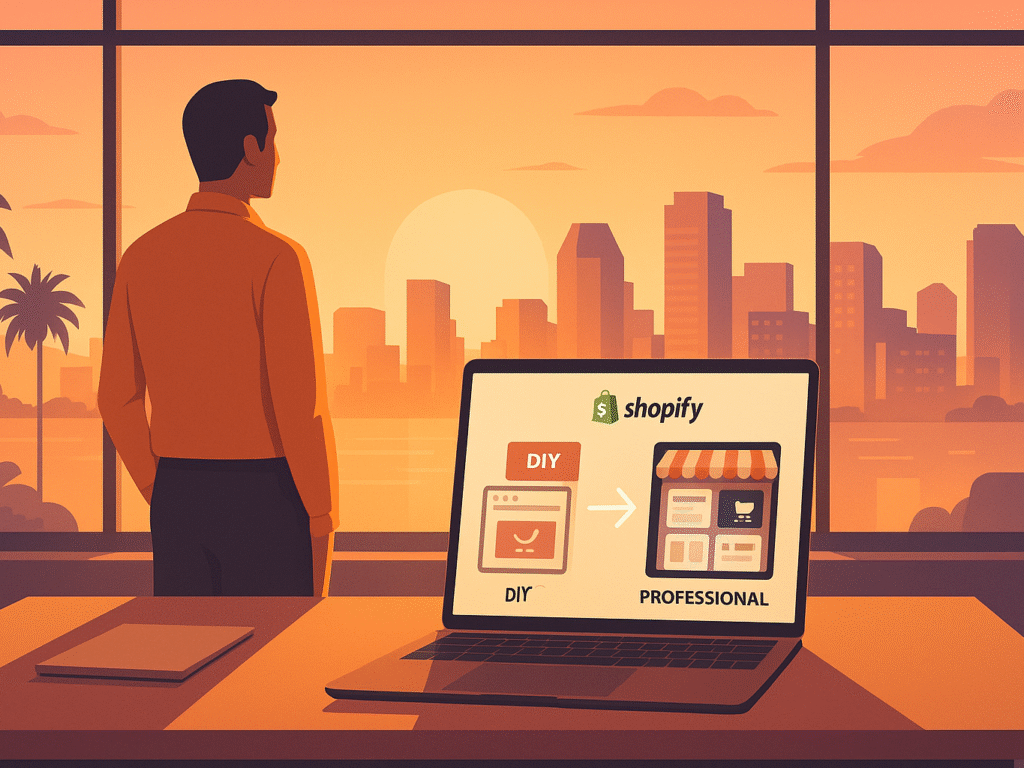
The Shopify website development cost in San Diego varies widely, ranging from DIY setups under $500 to professional services exceeding $40,000. Your choice depends on business goals, technical skills, and available time. DIY works for small stores, but complex features, faster results, and scalability often require hiring experienced Shopify website designers in San Diego who understand local market dynamics and can deliver results that drive growth.
Understanding all hidden Shopify website cost San Diego factors, such as Shopify plans, premium themes, apps, and ongoing maintenance, is crucial before making a decision. San Diego offers a rich network of affordable Shopify designers and agencies across different price points. Whether you go solo or hire help, knowing the actual Shopify website cost in San Diego avoids budget surprises.
Choosing the right path means striking a balance between budgeting and long-term value. A professional store might convert more customers, justifying the higher cost. Still, many brands in San Diego start small, upgrade later, and grow successfully. No matter your stage, Shopify’s flexibility supports every entrepreneur’s online journey.
FAQs on Shopify website development cost, San Diego
Q1. What is the cost range for developing a Shopify store in San Diego?
Shopify store development costs in San Diego typically range from $500 to $40,000, depending on complexity. Basic DIY or template customization costs $500–$1,000. Custom-designed stores with advanced features and professional support typically range between $5,000 and $20,000, while high-end agency work may exceed $ 30,000.
Q2. What are the subscription plan costs for Shopify in 2025?
As of 2025, Shopify offers plans starting at $5/ 5/month (Starter), ideal for social selling. The Basic plan costs $19 per month when billed annually or $39 per month every month. Shopify and Advanced plans cost $49 per month and $399 per month, respectively. Each plan includes varying levels of features, staff accounts, and transaction fees.
Q3. What are the benefits of hiring a professional Shopify designer?
Hiring a professional Shopify designer helps save time and ensures a polished, conversion-optimized store. Experts handle custom coding, app integration, and mobile responsiveness. It leads to fewer errors, faster launch times, and better performance, especially if your store requires specific features or a strong brand identity.
Q4. What should you consider when choosing between DIY and professional Shopify development?
DIY development is budget-friendly and ideal for small stores with a limited product range. However, if you lack technical skills or need custom features, hiring a professional is a more innovative approach. Consider your timeline, growth goals, and the complexity of your products when deciding whether to build it yourself or outsource development.
